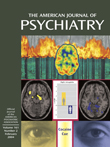Catechol O-Methyltransferase Val158Met Polymorphism in Schizophrenia: Differential Effects of Val and Met Alleles on Cognitive Stability and Flexibility
Abstract
OBJECTIVE: The catechol O-methyltransferase (COMT) Val158Met polymorphism has been associated with cognitive and behavioral phenotypes in schizophrenia. Whether COMT genotype is beneficial may depend on phenotype definition. The authors examined the effects of COMT genotype on a task that distinguishes imitation from reversal learning. They hypothesized that the Val and Met alleles would be associated with deficits in imitation learning and reversal learning, respectively. METHOD: Twenty-six patients with schizophrenia and schizoaffective disorder completed a task requiring alternation between imitation and reversal rules. RESULTS: Met homozygotes showed better acquisition of the imitation rule but greater deficit shifting from imitation to reversal. Val homozygotes had poorer imitation performance and slower reaction times. CONCLUSIONS: The Met allele, by increasing tonic dopamine, may promote cognitive stability but limit cognitive flexibility.



